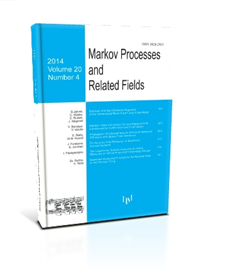An Improved Variant of Simulated Annealing that Converges Under Fast Cooling
M.C.H. Choi
2021, v.27, Issue 1, 123-154
ABSTRACT
Given a target function $U$ to minimize on a finite state space $\mathcal{X}$, a proposal chain with generator $Q$ and a cooling schedule $T(t)$ that depends on time $t$, in this paper we study two types of simulated annealing (SA) algorithms with generators $M_{1,t}(Q,U,T(t))$ and $M_{2,t}(Q,U,T(t))$ respectively. While $M_{1,t}$ is the classical SA algorithm, we introduce a simple and improved variant that we call $M_{2,t}$ which provably converges faster. When $T(t) > c_{M_2}/\log(t+1)$ follows the logarithmic cooling schedule, our proposed algorithm is strongly ergodic both in total variation and in relative entropy, and converges to the set of global minima, where $c_{M_2}$ is a constant that we explicitly identify. If $c_{M_1}$ is the optimal hill-climbing constant that appears in logarithmic cooling of $M_{1,t}$, we show that $c_{M_1} \geq c_{M_2}$ and give simple conditions under which $c_{M_1} > c_{M_2}$. Our proposed $M_{2,t}$ thus converges under a faster logarithmic cooling in this regime. The other situation that we investigate corresponds to $c_{M_1} > c_{M_2} = 0$, where we give a class of fast and non-logarithmic cooling schedule that works for $M_{2,t}$ (but not for $M_{1,t}$). In addition to these asymptotic convergence results, we compare and analyze finite-time behaviour between these two annealing algorithms as well. Finally, we present two algorithms to simulate $M_{2,t}$.
Keywords: simulated annealing; non-homogeneous Markov chains; strong ergodicity; relative entropy; spectral gap
COMMENTS
Please log in or register to leave a comment

